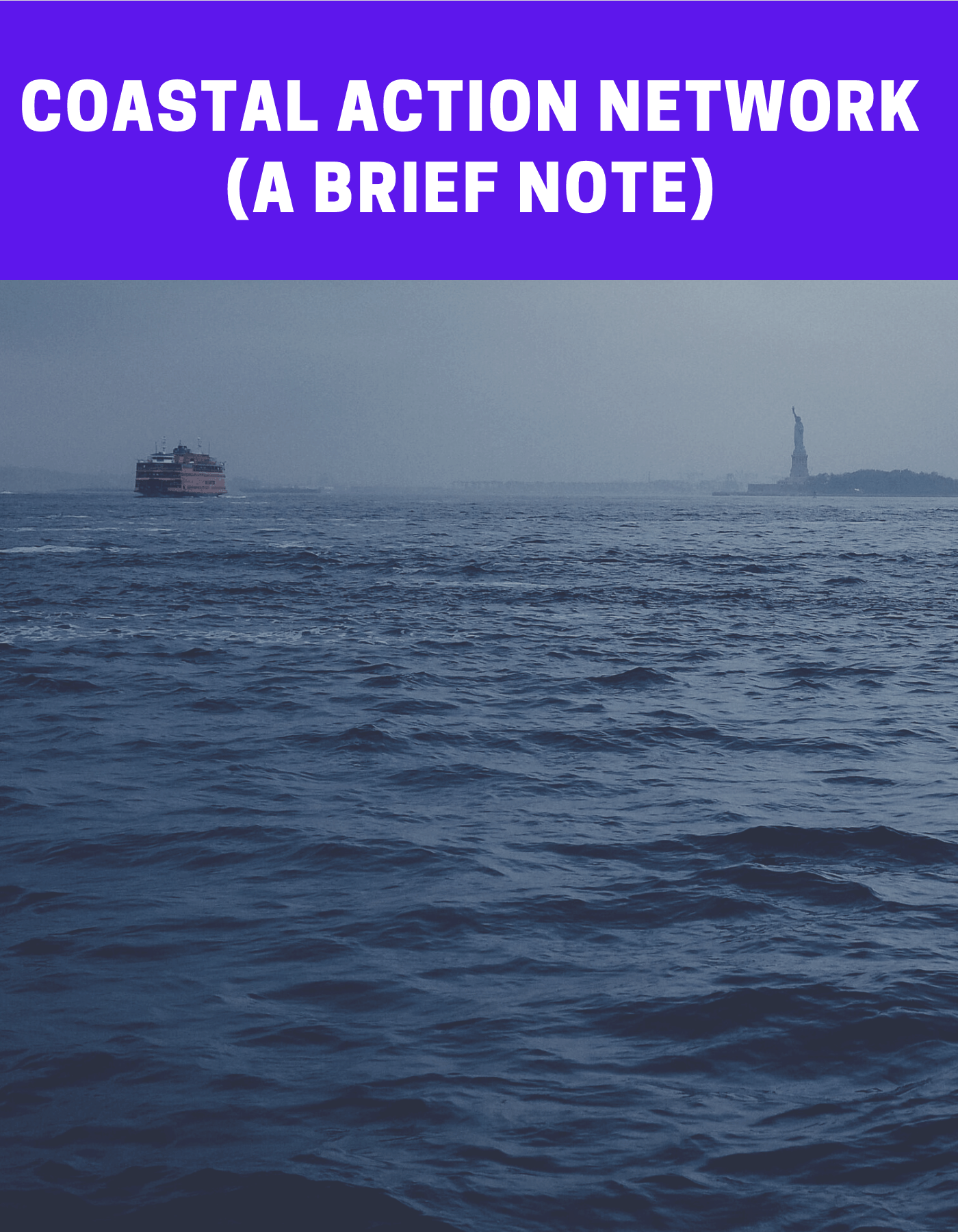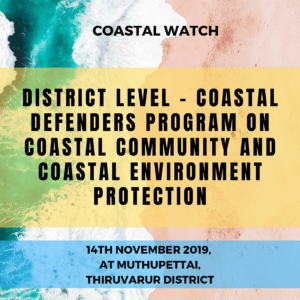Contact Addresses
Jesu Rethinam, Convenor: 11/1A, Sri Ramakrishna Paramahamsar Street (Backside of Nadar Street), Velippalayam, Nagapattinam – 611 001. Ph: 04365 – 248674, 248907; E-mail: coastalactionnetwork@rediffmail.com
A Brief Note on Coastal Action Network
Tamil Nadu is endowed with one of the largest and richest fishery wealth of India. The State has a 1000 km coastline with 1.9 lakh sq.km of EEZ covering the Coromandel Coast, Palk Bay, Gulf of Mannar and the West Coast, besides 21 coral islands in the Gulf of Mannar, with its rich habitats of live corals, coastal lagoons (Pulicat Lake and Muthupet Swamp) and estuaries. Regarding inland fisheries there are 5 major river systems, 51 reservoirs and innumerable tanks. The state has a tropical climate with a temperature ranging from 23 C to 40 C with an average annual rainfall of 945 mm. These natural resources harbour a variety of fin fishes, shell fishes and aquatic plants for developing the fishery wealth for the prosperity of Tamil Nadu. This rich bio-diversity and resources are under threat due to the processes of globalisation and the related economic policies of State and Central Governments.
The various interest groups such as Fishing People’s Organisations, Non-Government Organisations, Environmental and Consumer Groups, Academics, Lawyers and activists felt the need to evolve a broad based forum to protect the rights of the coastal communities and the coast from environmental degradation. Thus, a State level forum of these various organisations was formed in 1996 with the broad objective of protecting the coast and coastal communities.
CAN is involved in the following areas:
- Awareness education on coastal issues and their impact on coastal communities.
- Legal reforms with regard to the coast
- Public policy interventions and critique of budgetary allocations.
- Facilitating campaigns and struggles against destructive development projects along the coast.
I. Public Awareness / Education
Protecting and regenerating coastal ecology, bio-diversity & marine resources and coastal people’s livelihood is the essence of coastal zone management. The concept of balanced but optional exploitation of coastal resources advocated by the corporate sector and government agencies and scientific institutions is the most dangerous strategy for destroying the coast. The vision of this anti-people’s lobby is a coastline with petro-chemical industries (most of them are banned in other industrialised countries) pharmaceutical & other toxic industries, Defence projects, ports, power plants, water transport projects, aquaculture shrimp industries, hotels, tourist resorts, entertainment parks, high speed highway roads, etc. This exploitative – pro multinational – big business – hazardous industry and tourism promotion model is destroying the coast, the ocean and its people. Towards creating public opinion about these issues Coastal Action Network involves itself in various educational activities.
Some Activities:
- A Cycle Yathra was conducted to create awareness among the local people’s forum opposing the construction of the National Thermal Power Corporation Plant in the Cheyyur lagoon area on which thousands of salt workers and traditional fishing people depend.
- A Coastal Yathra was conducted along with the local fishing people’s organisations and consumer organisation in February 1999 to create awareness and provide support to the campaign against hazardous industrial complexes at Cuddalore.
- Presented a paper on the Impact of Shrimp Industries in the Workshop on Human Experience and Sustainable Coastal Management in 1996 organised by the Department of Geography, University of Madras.
- Made a presentation on Impacts of Shrimp Farming on Coastal Environment in the UGC Refresher course in Zoology on “Blue Revolution in Sustainable Development” for College / University teachers from 27.1.97 to 22.2.97 organised by Department of Zoology, Bharathidasan University.
- Presented a paper on Impacts of Shrimp Industries in the symposium on “Coastal Regulation Zone (CRZ) Notifications and their implication” by C.P.R. Environmental Education Centre in January 1998.
- Published educational material on Coastal Regulation Zone.
- Published educational material on important Supreme Court Judgements.
II. Legal Reforms
Some Activities:
- Submitted our objections in the Public Hearing conducted by the Tamil Nadu Pollution Control Board on the Petrochem Park project at Kattupalli (25 kms from Chennai) on 3rd May 2000 which will result in the destruction of the Pulicat Lake, a world famous wetland notified as a RAMSAR site.
Represented and submitted our objections before the Public Hearings organised by the Tamil Nadu Road Sector Project with regard to the II Phase construction of the
East Coast Road. - Submitted our criticisms and suggestions to the Ministry of Environment and Forests on the Tamil Nadu Coastal Zone Management Plan – 96. – We were able to achieve some changes due to this :
- Campaigned against the proposed 5th August 1999 amendment demanding to withdraw it.
- Campaigned to restore the CRZ law to the original position.
- Document CRZ violations and along the coast of Tamil Nadu including that of Shrimp Industries.
- Created necessary records to file interest litigation
- Submitted our objections to the dilution of CRZ law on 31.1.2000 in the hearing held at Chennai headed by Mr. Roy Paul, Chairman, National Coastal Zone Management Authority.
- Submitted a policy note on fisheries “Peoples policy for Development of Fisheries and the livelihood of the fishing community in Tamil Nadu” to the Expert Committee appointed by Government of Tamil Nadu to draft a fisheries policy for Tamil Nadu in 1996.
- Placed our views on the violations regarding the Phase I of East Coast Road before the Expert Committee headed by a retired Supreme Court Judge Mr.S.Natarajan Committee on December 16, 1999 at Tamil Nadu Pollution Control Board, Guindy, Chennai.
III. Facilitating Campaign against destructive developments along the coast
Some Activities:
- Supporting protest actions by the people’s organisations in Pulicat to protect the Water bodies – Pulicat Lake, Ennore creek, Buckingham canal and Kattupalli Island.
- Facilitated an Expert Committee study on the Industrial Complexes (between Ennore & Kattupalli) and its Impact on Pulicat (Pazhaverkadu) Lake, Kattupalli (Island) Panchayat, Ennore Creek and Buckingham Canal and Backwaters by the Expert Committee.
Facilitated an Expert Committee on Impact of Shrimp Industries which was submitted to the Supreme Court. - Solidarity actions to the movement against Sterlite industry at Tuticorin.
- Supported the campaign against the construction of the East Coast Road – Phase II (Tamil Nadu Road Sector Project – Corridor I).
- Organised a signature campaign demanding that the Ministry of Environment and Forests imposes the conditions on East Coast Road – Phase I, before giving clearance for Phase II.
- Documenting current available information on Sethusamudram project, the Power project at Vembar and the ship breaking yard at Valinokkam.
- Supporting the campaign against the construction of Pillaiperumalnallur Power project in Nagapattinam District.
- Supporting the campaign for the protection of the Great Vedaranyam Swamp and its eco-system including specifically the famous Mangrove lagoon at Muthupet.
- Supporting the Campaign against Shrimp Industries – enforcing Supreme Court orders.
Supported the Dharna and human chain at Chennai on 21st May 1999, organised by the fishing People’s organisation in Pulicat demanding to stop the construction of Ennore Satellite Port, the Petrochem Park at Kattupalli and the expansion of North Chennai Thermal Power Plant.
IV. Public Policy Regarding Fishing Community
The process of budget making and planning has remained an exercise that is not comprehended by the public. Government bureaucrats and political forces, lobbies of big industry trade, political party – based institutions do manage to get what they want by lobbying. Under the guise of being technical and professional, the whole budget exercise is made to remain a secret. Neither at the pre-budget phase nor during the discussion process of the budget session do people or social organisations working among people have any role to play.
The Tamil Nadu Government, like most other State Governments, follows what has been called ‘the incremental system of Budgeting’. It means that funds for any new programmes or schemes are available only after meeting the expenditures of all the ongoing programmes. The committed expenditures (salaries and related expenses, being the main among them) run at times as high as 97%. Staff salaries themselves are calculated to be as high as 55% in Tamil Nadu. So the budget of the New Year usually becomes nothing more than a carbon copy of the previous year, with minor changes. The above system obviously is unsuitable for a developing country like ours with constantly changing new demands and developments. Hence an alternate system of budgeting called ‘Zero Base Budget’ has been proposed.
Some Activities:
We are engaged in advocating and lobbying with Government either for protecting the existing law or for changing the policies and laws for the protection of coastal ecology and livelihood of fishing communities.
- A clear policy halting the present policy on deep sea fishing by Government of India needs to be outlined. Coastal Action Network has supported this campaign through various actions. Instead, a new deep sea fishing policy which centres around encouraging and developing the fisher people to enhance their deep sea fishing operations at a sustainable level with appropriate technologies is advocated.
- There has been a growing neglect of inland fisheries in reservoirs, lakes, tanks, ponds, etc. in Tamil Nadu. This neglect must be reversed as inland fisheries in reservoirs, tanks and ponds can produce common varieties of fish that will be accessible for the common people as nutritious food at reasonable prices.
- Though women constitute 50% of the adult fishing population their interests and needs do not figure in any significant manner in the Government policies, programs and budgets. It is crucial to recognise the contribution of women to fisheries development through their extensive marketing and involvement in processing of fish products.
- A complete ban on Monoculture Shrimp Industries should be enforced.
- A total ban on monsoon trawling and inshore trawling should be imposed and the usage of all destructive gears in fisheries should be halted.
- Free house sites should be given with joint ownership rights for all fishing families based on actual usage keeping in mind their special needs. A detailed plan for provision of drinking water, community centres, electricity, roads, sanitation, street lights, afforestation of coastal forests, prevention of erosion, etc. should be implemented. Common coastal village lands along the coast and upto the habitation of the fishing village must be vested solely with the fishing village and their Panchayats.
The fishing community should be categorised as scheduled tribes and accorded statuary status at the earliest as per the Mandal Commission Report. - A Fisheries Bank to cater to the specific credit needs of the artisanal fishermen and marketing needs of fishing women should be established.
- The High Court order prohibiting all Construction and related activity of East Coast Road should be strictly followed.
- Submitted the paper on ICMAM Plan, role of fishing communities in Coastal Zone Protection and Management, social priorities of fishing communities and prohibition of industrial / commercial activities in coastal areas in the Workshop on Integrated Coastal Area Management Plan for Chennai organised on 24th and 25th May 2000 by the Department of Ocean Development, Government of India in collaboration with Department of Environment, Government of Tamil Nadu, Ocean Engineering Centre, Indian Institute of Technology, Chennai and Resource Analysis, The Netherlands.




